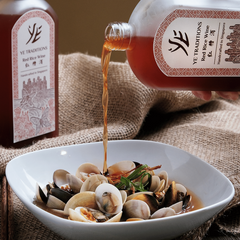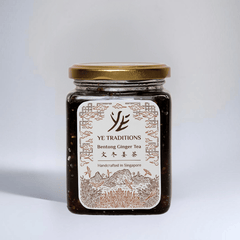Rice Wine During Confinement: Is It Safe if Baby Has Jaundice?
Debunking the Myth with Medical Facts
In many Asian cultures, rice wine plays an important role in postpartum confinement practices. Some common benefits is that it's used to warm the body, promote circulation, and aid in recovery. But what happens when a newborn is diagnosed with jaundice? A common (though INCORRECT) belief is that mothers should avoid rice wine entirely, especially while breastfeeding — for fear it might worsen the baby’s condition.
Let’s take a closer look at what medical science really says.
👶 What is Jaundice in Newborns?
Jaundice is a common condition affecting about 60% of newborns. It occurs when there's a high level of bilirubin — a yellow pigment produced during the breakdown of red blood cells. A newborn’s liver is still developing, so it may not process bilirubin efficiently right away.
In most cases, neonatal jaundice is mild and temporary, resolving on its own or with light therapy. In fact, two of my siblings had jaundice and I remember it being so comical that they had to be out in the sun doing light therapy!
🍶 The Role of Rice Wine in Confinement
Rice wine is used in many postpartum recipes — from ginger chicken to herbal soups — not just for flavor, but for its perceived "warming" and healing properties. Since rice wine contains alcohol, this has led to widespread concerns about its safety while nursing a jaundiced baby.
The Medical Reality is that it's safe in moderation!
Here’s what modern research and pediatric guidelines actually say:
1. Rice wine in cooked dishes is not the same as drinking
-
Most of the alcohol in rice wine evaporates during cooking (especially with boiling, steaming, or stir-frying). And in so many confinement meals, the alcohol ends up being cooked off.
-
Dishes made with rice wine — such as confinement soups — typically have minimal to no active alcohol content.
2. No evidence links small alcohol traces to worsened jaundice
-
There is no medical evidence that trace amounts of alcohol from breast milk worsen infant jaundice.
-
What’s often confused is “breast milk jaundice” — a rare, benign condition unrelated to alcohol, caused by natural compounds in some mothers' milk that slightly slow bilirubin breakdown.
3. Drinking (without cooking) rice wine = less than 2% passes into milk
-
If you drink a small amount (like 1 shot of rice wine), less than 2% of the alcohol enters your breast milk. And this is referring to an uncooked raw straight rice wine
-
The highest level of alcohol in breast milk appears 30–60 minutes after drinking, and drops steadily after that.
-
Waiting 2–3 hours after drinking before breastfeeding further reduces any exposure.
So What’s Safe?
-
Cooked rice wine dishes: Safe — the alcohol is mostly evaporated.
-
Moderate consumption of rice wine (e.g., 1–2 tablespoons daily in meals): Likely safe if spaced well before breastfeeding.
-
Direct drinking of rice wine or raw wine dishes: If you don't want to cook the rice wine and just drink it as is, best to wait 2–3 hours per drink before nursing.
Final Note: Trust Science, Not Just Myths!
Tradition matters — but so does clarity. If you're breastfeeding a baby with jaundice, it's not necessary to eliminate rice wine entirely. As long as it's used in cooking or consumed responsibly, the risk to your baby is extremely low.
When in doubt, consult a pediatrician — especially if your baby’s jaundice is persistent or severe.







Leave a comment